[vc_row css_animation=”” row_type=”row” use_row_as_full_screen_section=”yes” type=”full_width” angled_section=”no” text_align=”left” background_image_as_pattern=”without_pattern” z_index=””][vc_column][vc_column_text]
English Home | Blog | About | Articles | Listen | Subscribe / Order | Contribute
[/vc_column_text][/vc_column][/vc_row][vc_row css_animation=”” row_type=”row” use_row_as_full_screen_section=”no” type=”full_width” angled_section=”no” text_align=”left” background_image_as_pattern=”without_pattern”][vc_column][vc_empty_space][/vc_column][/vc_row][vc_row css_animation=”” row_type=”row” use_row_as_full_screen_section=”no” type=”full_width” angled_section=”no” text_align=”left” background_image_as_pattern=”without_pattern”][vc_column width=”4/5″][vc_empty_space][vc_column_text]
Justification
Catholicism vs Protestantism
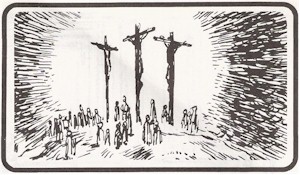

Several years ago the religious world was in the greatest religious conflict that this world has ever witnessed. A tremendous amount of literature has recorded a blow-by-blow account of the epic Catholic-Protestant struggle. Yet, after 400 years have gone by, the professed sons of the reformation generally have very little idea of the real issues of the conflict. If you ask a Protestant what a Roman Catholics teach, you will most likely be told that Catholics believe that his own works of merit may justify a sinner. But listen to what an authoritative Catholic catechism teaches:
Q: What is Justification?
A: it is a grace which makes us friends of God.
Q: Can a sinner merit this justifying grace?
A: No, he cannot; because all of the good works which a sinner performs whilst he is in a state of mortal sin, are dead works, which have no merit sufficient to justify.
Q: Is it an article of Catholic faith, that the sinner, in mortal sin, cannot merit the grace of justification?
A: Yes; it is decreed in the seventh chapter of the sixth session of the Council of Trent, that neither faith or good works, preceeding justification can merit the grace of justification.
Q: how then is a sinner justified?
A: He is justified gratuitously by the pure mercy of God, not on account of his own, or any human merit, but purely through the merits of Jesus Christ; for Jesus Christ is our only mediator of redemption, who alone by his passion and death, has reconciled us to his Father.
Q: Why then do the Protestants charge us with believing, that the sinner can merit the remission of his sins?
A: Their ignorance of the Catholic doctrine is the cause of this, as well as many of the other false charges.
–Rev. Steven Keenan, Doctrinal Catechism, pp.138, 139.
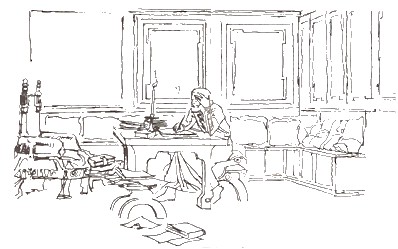
Two Aspects of Redemption
There are two great aspects of redemption
– Christ’s work for us.
– The Holy Spirit’s work in us.
Christ’s work for us
We may call this God’s work in Christ. This work of redemption was done entirely apart from us and without our assistance. Jesus lived a perfect life for us. He “died for our sins according the Scriptures.” 1 Cor. 15:3. He was “delivered for our offences.” Rom. 4:25.He entered the sanctuary, “having obtained eternal redemption for us.” Heb.9:12. “He ever liveth to make intersession for them.” Heb.7:25. He appears “in the presence of God for us.” Heb.9:24.
The Spirit’s work in us.
Without the work of the Holy Spirit working in the believer, the sacrifice of Jesus would be of no avail. The Spirit works in what Christ has worked out. The Holy Spirit carries out God’s work of grace in us.
These two aspects of redemption are illustrated by the two streams of blood and water which flowed from the pierced side of Jesus. Jesus offers His blood for us in the sanctuary above. The Spirit-represents the water- sanctifies the heart of the believer in Jesus.

Thus far all Christians should be agreed, whether they be Catholics or Protestants. No we must define the great dividing of the way which separates the streams of the Catholic and Protestant thoughts.
The Catholics Concept of Justification
Roman Catholics do not teach that a sinner can be justified by his own works of merit. Briefly, their position on justification is this: Christ’s work for us has made the gift of the Holy Spirit available to believers. (They are right thus far.) Men must first receive an infusion of righteousness by the Holy Spirit. The Spirit must work repentance and charity in the believer. God then pronounces the believer just because of the work that the Holy Spirit has done in him. Or to express it in a different way: Catholics teach that a man is justified before God only when the Holy Spirit has given that man a just nature. God merely ratifies the work which the Holy Spirit has done in the heart of the new believer.
The Birth of Protestantism
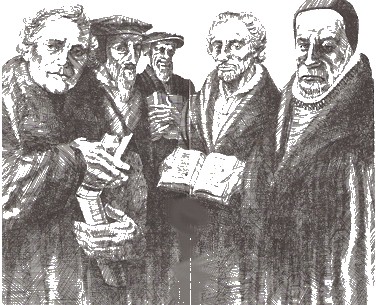
The Reformers were led to abandon the idea that the Holy Spirit work in them could make them could make them righteous in God’s sight. These were men who experienced, as few men have ever experienced, the power of sin in their lives. They knew what it was to struggle for holiness of heart. Never were there more earnest Roman Catholics then Luther, Calvin, Farrel, Melancthon and Tyndale. They believed that holiness came only from God and they tried to apprehend enough holiness in their lives in order that they could be accepted before God. Yet, being honest men, they could never see enough of God’s grace in their experience to give them any confidence towards God. Indeed, as they looked deep within their poor hearts, they saw sin in the form of pride, selfishness, unbelief, and unresponsiveness to God’s love, and egotism. They despaired over being justified by virtue of God’s given work of grace in them. Then came their enlightenment in the evangelical faith. They rediscovered Paul’s doctrine of justification by faith. In the book of Romans the apostle sets forth the gospel truth that the sinner is not justified by an infused righteousness but by an imputed righteousness- meaning a righteousness that is wholly founding Another. A believer was justified by a virtue of what god had wrought out in him but by virtue of what God had wrought out in Jesus Christ. But now the righteousness of God without the law is manifested, being witnessed by the law and prophets; even the righteousness of God which is by faith of Jesus Christ unto all and upon all them that believe: for there is no difference: for all have sinned, and come short of the glory of God; being justified freely by his grace through the redemption that is in Jesus Christ: whom God hath set forth to be a propitiation through faith in His blood, to declare His righteousness for the remission of sins which re past, through the forbearance of God; to declare, I say, at this time His righteousness; that he might be just, and the justifier of him which believeth in Jesus. Where is the boasting then? It is excluded. By what law? of works? Nay: but by the law of faith. Therefore we conclude that a man is justified by faith without the deeds of the law. -Rom.3: 21-28.
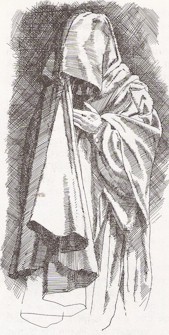
In these words of the apostle Paul, the Reformers found a certain ground of hope. They saw that men need not look within their own experience to find something that will give them any assurance that they may stand acceptable before God. The Reformers were confronted with the great gospel truth that God had already forgiven and accepted them in Jesus Christ, that justification had passed upon the human race through Christ, that God had reached down and made the human family the friends and children of God in Jesus Christ (Romans 5:10,18). And by faith in God’s perfect work, faith alone in God’s finished work in Jesus Christ, they could now rejoice that the righteousness of Jesus was freely imputed to them.
Good Works and Justifying Merit

We must never charge Catholics with teaching that a sinner, in his unregenerate state, can do any good works that have merit in God’s sight. But they do teach that there is merit in the good works wrought out in the life by the Holy Spirit. Notice:
Q: Must we then concluded, that the sinner cannot, by good works, obtain the grace of justification?
A: The sinner may obtain the grace of justification by good works proceeding from a broken and penitent heart, because these are necessary predispositions and conditions , but no works of his own can ever MERIT the grace of justification…
Q: What is that which gives their value to good works?
A: Sanctifying grace, which is in us.
Q: Is this sanctifying grace our own, or is it from God?
A: It is the pure gift of God’s liberality to us.
Q: How does St. Paul express himself on this subject? (Ro., chap V, 5)
A: “The charity of God,” he says, “is poured forth in our hearts by the Holy Ghost, who is given to us.”
Q: What are the affects of sanctifying grace?
A: It makes us the friends and children of God. – Ibid., pp.139,144,145.
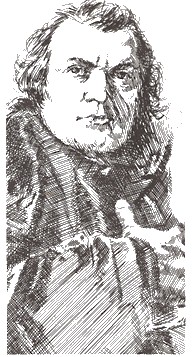
The Protestant Reformers utterly rejected the idea that there is justifying merit even in works wrought out by the power of the Holy Spirit. Although the Catholic position on good works was clothed with the appearance of sanctity, Luther discerned that it was the mind of the mystery of inquity. In theory, Catholic doctrine teaches men to trust in God work in them. In practice, it leads them to actually depend on their own works. Armed with the great teaching of the sinfulness and imperfection of human nature (Eccl. 7:20, ect.). Good works, declared the Reformers, can only be considered good is the merits of Jesus are added to them to make up for their deficiency and imperfection. Wrote Luther, “No one can be certain that he is not continually committing mortal sin, because of the most secret vice of pride.” The Pope condemned this statement in his bull excommunicating Luther, but the Reformer responded, ”Therefore I must retract this article, and say now that no one should doubt that all our good work are mortal sins, if they are judged according to God’s judgment and severity and not accepted as good by grace alone.” Again he declared, “Every good work is sin unless it is forgiven by the mercy of God.” Quoted in Paul Althaus, The Theology of Martin Luther, p. 149. In A Commentary on St. Paul’s Epistle to the Galatians (pp. 176,177), Luther thundered that the merits of all works, ”before grace and after,” should be thrown down to hell. Thus did this to man of God that teach that we can never look within us for justifying merit. Contrary to Roman Catholics, the Protestants taught that while sanctifying grace within a believer enables him to do good works, only the merits of Christ can make those good works acceptable to God. Sanctifying does not make us the friends of God, they said, but it is rather the fruit of becoming God’s children by faith in Christ’s work done wholly outside of us.
The Freedom and Certainty of the Gospel
Before his enlightenment, Luther vainly looked within his own heart for enough repentance or conversion to assure him of his acceptance with God. “How dare I believe in the favor of God. While there is nothing in me like true conversion? I must be changed before he can receive me.” Such was the Roman darkness that enveloped he soul. He dreaded those Scriptures that speak of repentance. But after his Enlightenment in the Gospel, the passages so much dreaded became his delight- to use his own words, “ an agreeable sport, and the most delightful recreation.” All the passages of Scripture that frightened him seem now to rise up from all sides, smiling, and leaping, and sporting with him. – J.H. Merle D’Aubigne, History of the Reformation of the Sixteenth Century, vol. 1, pp. 130,131. Luther contemplated with great joy the words of Paul, “…[Christ] loved me and gave Himself for me.” Gal. 2:20. While he was a wretched sinner in a state of rebellion against God, Luther perceived that the Lord of glory forgave him freely in Jesus Christ and bestowed upon him all the treasures of eternity. Luther saw that he could experience justification solely by believing in what Christ had done for him. The Catholic Council of Trent decreed that God only justifies those who are born again. But Protestant held to the great declarations of the apostle Paul:
…But believeth on Him that justified the ungodly… -Romans 4:5.
…God imputeth righteousness without works…-Romans 4:6.
…faith was reckoned to Abraham for righteousness… not in circumcision, but in uncircumcision. -Romans 4:9,10.
…God would justify the heathen through faith…-Galatians 3:8.
God justifies the ungodly , the uncircumcised, and the heathen through faith, without work. This doctrine is an offense to “good, clean Christian people.” But the Reformers who had struggled for years to find favor with God through the work of the Holy Spirit in them, it was a message of unspeakable joy. God freely loves and forgives the vilest sinner and sets tem free from all condemnation solely because he has faith in God’s wonderful work in Jesus Christ.
Christ came to save sinners (Matt. 9:13, 1 Tim. 1:15), and because I am a sinner, I am entitled to come to Christ. I know of no better news given under heaven than that. In this world of truth I may have the greatest certainty, liberty and boldness, whereby I may believe in God’s work of grace for me in Jesus Christ. The message of the gospel is that God loves sinners, that while they were in sin and rebellion he passed the free gift of justification upon all men (Romans 5:18). In God’s own purpose of love, which He has purposed in Christ Jesus our Lord, He has already accepted and forgiven the whole human race. The great unto question to be decided is not, “will God forgive me and accept me?” He has done this in Jesus Christ. If God could reconcile us to Himself when we were enemies (Romans 5:10), how much more will He love and receive us and pronounce us righteous when we accept His great gift by faith! The great question to be decided is, “Will I accept God’s adoption as His son by Jesus Christ unto Himself? Will I accept the free pardon already given in Jesus Christ?”
In the gospel of the imputed righteousness of Christ, the Reformers beheld the smiling faces of the heavenly Father. God sent His son into the world not to condemn it but to bestow His blessing of loving favor upon the children of men. The gospel is the good news of what God has done. In Jesus Christ the world has been accepted into the family of heaven.
The Protestants did not deny the reality or necessity of God’s work of grace in the hearts of men by the power of the Holy Spirit. They did not make light of good works. But they placed truth in its right order. They perceived that faith in Christ’s work for us brings the Holy Spirit to work in us. They accepted with joy the grand gospel message that God justifies freely, solely on the ground, the solid ground, of Christ’s work for us. This blessed truth of justification by faith brought from their hearts such a response of love and gratitude to God that the windows of their souls were thrown open heavenward, as they experienced the renewing and sanctifying power of God’s Spirit in their lives. The repentance and good works, which they formerly tried to grind out of their own poor hearts, sprang forth spontaneously. The whole of Europe shook with a mighty army of evangelicals on the march. Through their preaching of justification by faith, the papal power received a deadly wound.

